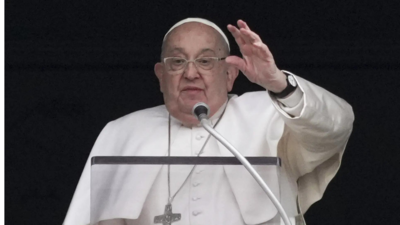VATICAN CITY: Pope Francis denounced an era of “disinformation and polarisation” on Friday in a message for World Communications Day, as he criticised powerful social networks creating “fanaticism and even hatred”.
In saluting journalists, he spoke of their collective responsibility working “in these our times, characterised by disinformation and polarisation, as a few centres of power control an unprecedented mass of data and information”.
The 88-year-old pope, who has warned in the past of the dangers of new technologies, including social media and artificial intelligence, did not cite Facebook or X by name, but his target was evident.
“Too often today, communication generates not hope, but fear and despair, prejudice and resentment, fanaticism and even hatred,” the pope wrote in his message.
“All too often it simplifies reality in order to provoke instinctive reactions; it uses words like a razor; it even uses false or artfully distorted information to send messages designed to agitate, provoke or hurt.”
The pope’s admonition comes as X, owned by Elon Musk, has been accused of spreading false information while interfering in European politics, in particular for attacking leaders including German Chancellor Olaf Scholz and British Prime Minister Keir Starmer.
The billionaire also used his platform and vast wealth to help propel Donald Trump to the White House.
Meta has also come under fire after its chief Mark Zuckerberg said this month that Facebook would end its third-party fact-checking programme in the United States, in what critics warned would further fuel false information online.
In a speech quoting Martin Luther King Jr., Francis said he dreamed of “communication that does not peddle illusions or fears but is able to give reasons for hope”.
He warned, however, of algorithms that feed social media users information that is specifically catered to their interests and prejudices.
Such “digital systems… by profiling us according to the logic of the market, modify our perception of reality”, he said.
“As a result, we witness, often helplessly, a sort of atomisation of interests that ends up undermining the foundations of our existence as a community, our ability to join in the pursuit of the common good, to listen to one another and to understand each other’s point of view.”
Earlier this month, in his New Year’s address to Vatican diplomats, Francis lamented increasing polarisation in society, “aggravated by the continuous creation and spread of fake news”.
Francis himself is a frequent target of unfounded rumours and manipulated photos online.




